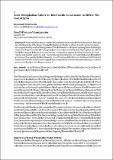Files in this item
From Westphalian failure to heterarchic governance in MENA : the case of Syria
Item metadata
| dc.contributor.author | Hinnebusch, Raymond | |
| dc.date.accessioned | 2019-11-11T00:36:07Z | |
| dc.date.available | 2019-11-11T00:36:07Z | |
| dc.date.issued | 2018 | |
| dc.identifier | 252649714 | |
| dc.identifier | df7d9a65-cd49-43a6-a747-f7ea8ca6cd11 | |
| dc.identifier | 85046713750 | |
| dc.identifier | 000432218200002 | |
| dc.identifier.citation | Hinnebusch , R 2018 , ' From Westphalian failure to heterarchic governance in MENA : the case of Syria ' , Small Wars and Insurgencies , vol. 29 , no. 3 , pp. 391-413 . https://doi.org/10.1080/09592318.2018.1455330 | en |
| dc.identifier.issn | 0959-2318 | |
| dc.identifier.other | ORCID: /0000-0001-5800-6606/work/60630168 | |
| dc.identifier.uri | https://hdl.handle.net/10023/18894 | |
| dc.description.abstract | The problematic export of the Westphalian system to MENA is examined, taking Syria as exemplar. The export model is juxtaposed to actual non-lineal trajectories, semi-sovereignty and hybrid or failing states. This is manifested in post-uprising Syria in failing statehood, fragmented and overlapping governance, permeable and collapsing borders, the loss of sovereignty to trans-state movements, “competitive regime-building” between the Asad regime and jihadist warlords, and “competitive interventionism” by external powers filling the governance vacuum with their own proxies. The result is heterarchic zones of limited statehood in which state sovereignty is contested by both international (supra-state) penetration and sub-state fragmentation. | |
| dc.format.extent | 23 | |
| dc.format.extent | 646810 | |
| dc.language.iso | eng | |
| dc.relation.ispartof | Small Wars and Insurgencies | en |
| dc.subject | Westphalian system | en |
| dc.subject | Syria | en |
| dc.subject | State failure | en |
| dc.subject | Heterarchic governance | en |
| dc.subject | Middle East | en |
| dc.subject | Hybrid regimes | en |
| dc.subject | Civil war | en |
| dc.subject | Governance | en |
| dc.subject | Heterarchy | en |
| dc.subject | Westphalian order | en |
| dc.subject | JZ International relations | en |
| dc.subject | Social Sciences(all) | en |
| dc.subject | T-NDAS | en |
| dc.subject.lcc | JZ | en |
| dc.title | From Westphalian failure to heterarchic governance in MENA : the case of Syria | en |
| dc.type | Journal article | en |
| dc.contributor.institution | University of St Andrews. School of International Relations | en |
| dc.identifier.doi | 10.1080/09592318.2018.1455330 | |
| dc.description.status | Peer reviewed | en |
| dc.date.embargoedUntil | 2019-11-11 |
This item appears in the following Collection(s)
Items in the St Andrews Research Repository are protected by copyright, with all rights reserved, unless otherwise indicated.

